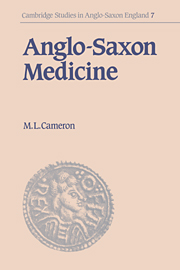Book contents
- Frontmatter
- Contents
- Preface
- Acknowledgements
- List of abbreviations
- 1 Introduction
- 2 Conditions for health and disease
- 3 Physician and patient
- 4 The earliest notices of Anglo-Saxon medical practice
- 5 Medical texts of the Anglo-Saxons
- 6 Compilations in Old English
- 7 Compilations in Latin
- 8 Latin works translated into Old English: Herbarium and Peri Didaxeon
- 9 Sources for Old English texts
- 10 Making a Leechbook
- 11 Materia medica
- 12 Rational medicine
- 13 Magical medicine
- 14 The humours and bloodletting
- 15 Surgery
- 16 Gynaecology and obstetrics
- 17 Conclusions
- Appendix 1 Quotations for ch. 10
- Appendix 2 Quotations for ch. 13
- Appendix 3 Quotations for ch. 14
- Appendix 4 Quotation for ch. 15
- Bibliography
- Index
11 - Materia medica
Published online by Cambridge University Press: 30 September 2009
- Frontmatter
- Contents
- Preface
- Acknowledgements
- List of abbreviations
- 1 Introduction
- 2 Conditions for health and disease
- 3 Physician and patient
- 4 The earliest notices of Anglo-Saxon medical practice
- 5 Medical texts of the Anglo-Saxons
- 6 Compilations in Old English
- 7 Compilations in Latin
- 8 Latin works translated into Old English: Herbarium and Peri Didaxeon
- 9 Sources for Old English texts
- 10 Making a Leechbook
- 11 Materia medica
- 12 Rational medicine
- 13 Magical medicine
- 14 The humours and bloodletting
- 15 Surgery
- 16 Gynaecology and obstetrics
- 17 Conclusions
- Appendix 1 Quotations for ch. 10
- Appendix 2 Quotations for ch. 13
- Appendix 3 Quotations for ch. 14
- Appendix 4 Quotation for ch. 15
- Bibliography
- Index
Summary
The Lord hath created medicines out of the earth; and he that is wise will not abhor them.
To appreciate the pharmaceutical resources and materia medica of the Anglo-Saxons, answers to certain questions must be sought: (1) What substances were prescribed in remedies? (2) Were these substances obtainable in England at that time? (3) What was the therapeutic value of these substances and could they be expected to have beneficial effects on the ailments for which they were prescribed? We shall deal with the first two of these questions in this chapter and discuss the third one in the next two chapters on rational and magical treatments.
The first thing that strikes one looking at a list of prescribed drugs is their extraordinarily large number. They are of plant, animal and mineral origins, but those of plant origin are by far the largest group. In Bald's Leecbbook, bk I, there are over 300, of which about 80 per cent are of plant origin, and in Leechbook III there are more than 250, about 70 per cent of plant origin. Medicines of animal origin include the flesh and fats of various mammals, birds, fishes and invertebrates, and bodily products including butter, milk, cheese, eggs, gall, wool, hair, bone, spittle, blood, urine and faeces, the last four forming what the Germans have called a Dreckapotheke (‘filth pharmacy’). The flesh of animals was used mostly in special diets; butter, milk, cheese, eggs and gall were common ingredients in medicines; wool was used as a base for applications; hair and bone were rarely used, and of Dreckapotheke urine and blood were used much more frequently than faecal matter, spittle being rarely called for.
- Type
- Chapter
- Information
- Anglo-Saxon Medicine , pp. 100 - 116Publisher: Cambridge University PressPrint publication year: 1993



